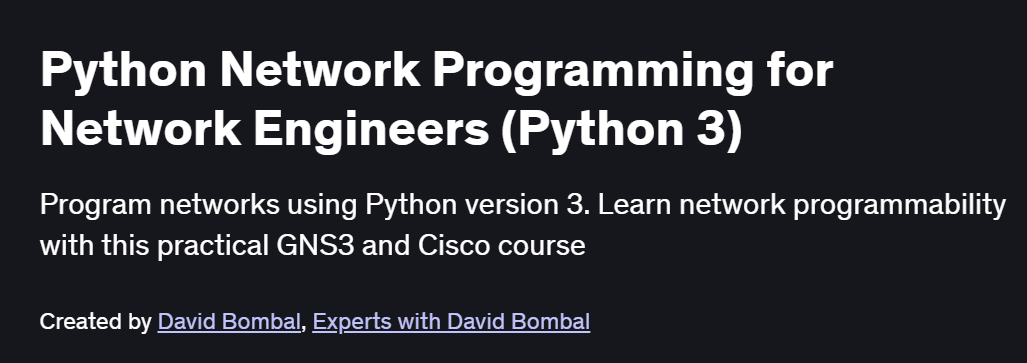What will you in Python Network Programming for Network Engineers (Python 3) Course
Automate network device interactions over SSH/Telnet using Paramiko and Netmiko
Parse and manipulate structured network data (JSON, XML, YAML) from APIs and device outputs
Build network automation workflows with NAPALM for configuration management and state retrieval
Develop custom network monitoring scripts using SNMP (pysnmp) and RESTful APIs
Integrate automation into orchestration platforms (Ansible, Flask web apps) for scalable operations
Program Overview
Module 1: Environment Setup & Python Refresher
⏳ 45 minutes
Installing Python 3, virtual environments, and essential libraries (Netmiko, NAPALM)
Quick review of Python basics: data structures, functions, and exception handling
Module 2: SSH Automation with Netmiko
⏳ 1 hour
Establishing SSH sessions to routers/switches, sending commands, and handling responses
Automating common tasks: configuration backups, VLAN creation, and interface checks
Module 3: Device Interaction with Paramiko & Telnetlib
⏳ 45 minutes
Low-level SSH via Paramiko and legacy Telnet sessions with Telnetlib
Secure file transfers with SFTP for firmware and config uploads
Module 4: Configuration Management with NAPALM
⏳ 1 hour
Uniform API for multi-vendor support (Cisco IOS, JunOS, Arista EOS)
Retrieving and comparing running vs. candidate configs, applying batches of changes
Module 5: Parsing Network Data
⏳ 1 hour
Parsing JSON, XML, and text outputs using Python’s built-in and
lxmllibrariesExtracting interface statistics, routing tables, and ARP entries for reporting
Module 6: SNMP & API-Based Monitoring
⏳ 45 minutes
Querying device metrics (CPU, memory, interface counters) with
pysnmpConsuming vendor REST APIs (e.g., Cisco DNA Center, Juniper Contrail) for telemetry
Module 7: Orchestration & Web Integration
⏳ 45 minutes
Building simple Ansible playbooks with Python modules for network tasks
Creating a Flask-based web UI to trigger automation scripts
Module 8: Best Practices & Next Steps
⏳ 30 minutes
Error handling, logging, and secure credential storage (Vault, environment variables)
Scaling automation: threading vs. async, integrating with CI/CD, and community resources
Get certificate
Job Outlook
Network automation skills are essential for roles such as Network Engineer, DevNet Engineer, and SRE
In demand for organizations adopting intent-based networking and programmable infrastructure
Enables transition to DevOps and NetOps positions, reducing manual intervention and errors
Provides a foundation for certifications: Cisco DevNet Associate/Professional and vendor automation badges
Specification: Python Network Programming for Network Engineers (Python 3)
|





